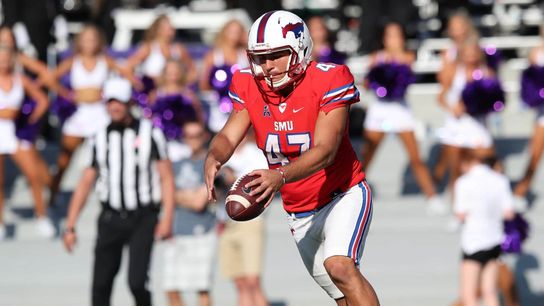The former college football player who wants to change the way players are recruited was never recruited himself, not in the traditional sense we understand it. "I didn't even know what the game was, truthfully, until the age of 17," James Sackville told me over Zoom last month.
A student at Caulfield Grammar School in Melbourne, Australia, Sackville dreamed of playing Aussie rules football professionally. When it became clear that players four inches taller could do the same things he did at 5-foot-10, those dreams died at 17.
He then joined ProKick Australia -- "I thought I had a pretty good kick on me," he said in that magnificent Australian accent -- the program that has disrupted the American football kicking market by importing some of the game's best punters. (As an aside: the reason Aussies are so natural at punting is that they practicing kicking their football like we practice throwing ours. For the same reason a quarterback doesn't need to look at his hand to get the ball where he wants it to go, an Australian doesn't need to look at their foot to kick it to a certain spot.) At ProKick Australia, the recruiting process is a much more centralized, top-down version than what we're used to.
"If (a school) want a left-footed punter who can roll out, my coaches would show me," he said. "If the coach for whatever reason would say, 'No, we don't want him,' my coaches would show the next guy.' They wouldn't say, 'Here are our 10 best guys, take your pick.'"
After learning what American football was in January of 2016, by July he was on a flight to Dallas to join SMU's football team, and by the fall he was the Mustangs' starting punter.
"He's super, super competitive," said UCF director of football operations SJ Tuohy, an SMU special teams assistant during Sackville's time in Dallas. "We're playing Houston at home. Houston bailed out on punt returns and he said on Monday, 'Coach, I can get a first down here.' The coach said, 'Absolutely not, freshman. You're going to punt the ball.' We didn't put it in. Second punt of the game, this dude just takes off. It's 4th-and-11 and I'll be damned if he didn't get 31 yards." (Editor's note: The box score shows it was the fourth punt of the game and Sackville picked up 12 yards on a 4th-and-9, but the point remains.)
As he acclimated to college life in foreign country while playing a foreign sport, Sackville absorbed recruiting stories from his SMU teammates. "I got to America and heard all these stories: 'My high school coach screwed me. I was sick when I went to this camp so my reputation was screwed,'" he remembered.
A business student, those laments struck Sackville as a problem he could solve. "Either my teammates think they're better than they are, or they really are great and they just slipped through the cracks. Why?"
After punting 197 times over his first three seasons, Sackville suffered an offseason injury ahead of his senior year and missed most of 2019. He was close to transferring to Auburn last summer but, with the pandemic threatening the season, he pivoted away from playing college football and began working on changing it.
Sackville launched Athletes in Recruitment (AIR), a new app that will attempt to translate the recruiting experience into the social networking Internet. If Bumble and LinkedIn had a child that wanted a football scholarship, that child would be AIR.
Players will make profiles which will go beyond the height, weight, GPA and Hudl link we all see on Twitter -- the digital equivalent of an athletic résumé, the ability to tell their own story and control their own narrative. Beyond the standard measurables, each player will have the opportunity to upload video of themselves running the 40 as well as clips going through the types of drills coaches like to see. And this is key: rather than trusting a player or his parents to provide accurate measurements, AIR allows third-party liaisons -- coaches, trainers, etc. -- to verify each piece of information attached to a recruit.
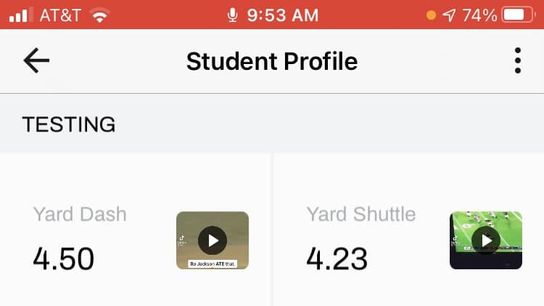
Once a player enters his profile, coaches can then sort and search for recruits the way a Millennial or Generation Z'er looks for a date.
"College coaches have the ability to sort, filter and swipe on a specific student-athlete based on their wants and needs. Whether it be from an academic standpoint, a location standpoint, physical traits, who else offered you, and they can essentially build their own player in that regard," Sackville said. "If you're looking for a 5-foot-6 quarterback in Alaska, our algorithm is designed to find one."
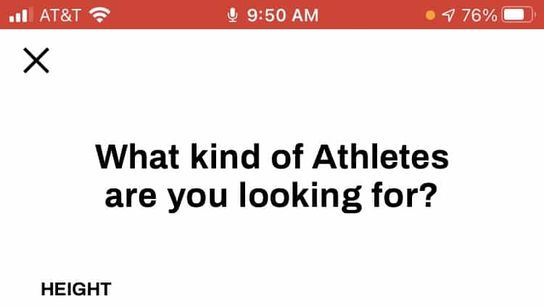
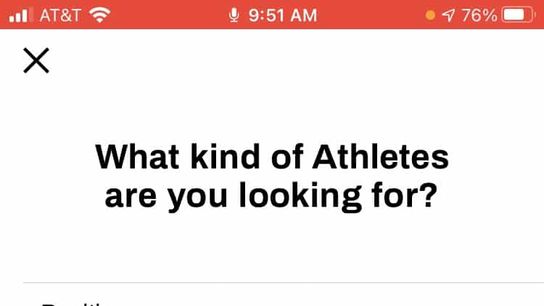
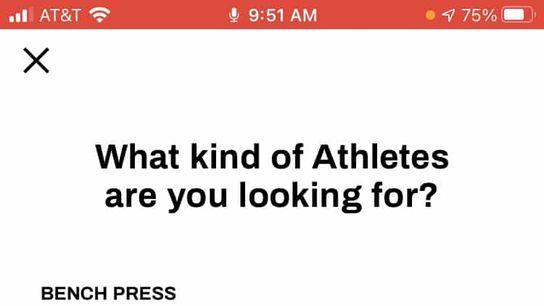
Like LinkedIn, AIR professionalizes the online recruiting process with a clean, attractive interface where a player's professional references can boost his credibility to prospective coaches.
AIR recognizes the scholarship offer is the market driver in this particular economy. Both player and coach can swipe right or left on each other but, like Bumble, only coaches can initiate conversations.
"The psychology in dating is the same as it is in recruiting. Both parties have a specific want and need; both parties need each other in order to achieve said want and need," Sackville said. "They're the attraction. They hold the scholarship, the golden ticket."
The marketing strategy will work on three fronts: Recruits will be sold on access to coaches; Coaches will be sold on access to players; and Liasions will be sold on the access to the market. In an ideal world, the 2024 version of Trevor Lawrence will sign up to market himself to coaches, coaches will sign up to find the 2024 version of Trevor Lawrence, and that player's personal QB coach will create an account to attach his name to that player, thereby marketing himself to other players.
AIR will not charge coaches. Players can create free accounts but, like Bumble, they'll have to pay for premium permissions. "We will give student-athletes the ability to super like schools, the ability to swipe more than three schools in a 24-hour period," Sackville said.
"Coaches and kids are swiping through Instagram, Facebook, TikTok and everything else just for leisure. They're already trained to do most of their time on the phone flicking up, down, side to side. For him to incorporate the ability to get exposure through a medium that's ingrained in our day to day lives I think is a really smart idea," SMU director of football operations Scott Nady said. "The reality is college coaches are going to look at five or six clips of a kid, at the most, before they decide to either turn off the tape or keep watching. A lot of times it's maybe three clips. If they can do that really quickly with a handy app, that's a win for them and a win for the kids."
